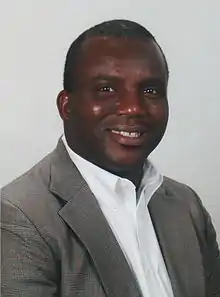Chidi Chike Achebe
Chidi Chike Achebe (born 24 May 1967) is a Nigerian-American physician executive. He is the chairman and CEO of AIDE – African Integrated Development Enterprise. He has served as the president and CEO of Harvard Street Neighborhood Health Center as well as assistant professor at Tufts University School of Medicine. Achebe currently serves as medical consultant; Clean water for kids – an NGO that brings fresh water to underserved communities in Liberia; and advisor for Tesfa Health, Bahirdar, Ethiopia.

Born in Enugu in southeastern Nigeria, Achebe is the third child of Chinua Achebe and Professor Christie Chinwe Okoli-Achebe. His father is regarded as the "father of modern African literature" and best known for the trilogy of classic African novels Things Fall Apart (1958); "No Longer at Ease" (1960); and "Arrow of God" (1964). In 1972, shortly after the end of the civil war between Republic of Biafra and Nigeria, the family moved to the U.S. for about five years while his father held professorships at American universities. They resided again in Nigeria during the 1980s, before returning to America.[1] His younger sister Nwando Achebe is an award-winning historian and professor at Michigan State University.
Chidi Achebe is married to Maureen Okam-Achebe who is a Hematology/Oncology specialist at Harvard University's Brigham and Women's hospital. They have three sons.
Education and career
Achebe completed undergraduate studies in natural sciences, history and philosophy at Bard College; received an MPH from the Harvard School of Public Health, his MD at Dartmouth Medical School and an MBA degree at Yale University's School of Management. He also completed his residency in both Internal Medicine and Pediatrics at the University of Texas, Texas Medical Center in Houston, Texas. After several years of work at various Boston health centers, Achebe says he now sees "the struggle against inequalities in health and health care for all vulnerable, under served Americans, as the next stage of the Civil Rights movement".[2]
Achebe was awarded the 2012 Dartmouth College Martin Luther King Award (Ongoing Category).[3]
Selected papers and publications
- OIL: Prize or Curse (With Paul Epstein)[4]
- AIDS: A Disease of Mass Destruction[5]
- AIDS: An Assault to our shared humanity[6]
- Contributions of the African American: A Black History Month Essay[7]
- Prostate Cancer and Black Men: A call to Action[8]
- The Polio Epidemic in Nigeria: a Public Health Emergency (2)[9]
- Yale School of Management: Article on the Leadership in health Care program[10]
References
- Ezenwa-Ohaeto (1997). Chinua Achebe: A Biography. Bloomington: Indiana University Press. p. 280. ISBN 9780253333421.
- http://archive.boston.com/yourlife/health/men/articles/2004/11/02/medical_care_the_next_civil_right/
- https://www.dartmouth.edu/~mlk/awards/sjaarchive.html
- Achebe, Chidi; Epstein, Paul R. (2003). "Oil: Prize or Curse?". Energy Bulletin. Retrieved 15 January 2013.
- Achebe, Chidi (2004). "AIDS: 'A Disease of Mass Destruction'". Dialectical Anthropology. 28 (3–4): 261–287. doi:10.1007/s10624-004-3590-8. Archived from the original on 1 June 2014. Retrieved 15 January 2013.
- "AIDS: 'A Disease of Mass Destruction' An Assault to our Shared Humanity". Mary Slessor Journal of Medicine. 4 (1): 1–17. 2004. doi:10.4314/msjm.v4i1.11019. Retrieved 15 January 2013.
- Ojukwu, Adeze (March 2004). "Contributions of the African American". Archived from the original on 14 April 2010. Retrieved 15 January 2013.
- Achebe, Chidi; Howard-Robinson, Victoria (January 2004). "Prostate Cancer and Black Men: A call to action". Archived from the original on 23 March 2005. Retrieved 15 January 2013.
- Achebe, Chidi; Lisa McGuire - Public Health Liaison (2004). "The Polio Epidemic in Nigeria: a Public Health Emergency (2)". UMN: Bio-Med Library – Public Health. Archived from the original on 2014-07-19.
- "First MBA for Executives Class Graduates..." Yale School of Management. Archived from the original on 4 August 2007. Retrieved 15 January 2013.